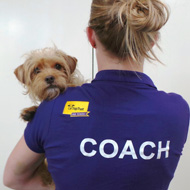
Rehoming centres brace themselves for influx of dogs as the new term starts.
A leading charity is calling on dog owners to attend puppy classes in a bid to reduce the number of dogs being given up as the new school year begins.
Through its 'bark to school' campaign, Dogs Trust hopes to encourage anyone finding their dog's behavour challenging after the summer holidays to sign up for its Dog School classes.
The call comes as the organisation prepares itself for an influx of handovers as families return to the post-holiday juggle of work and school.
Dogs Trust has already noted a spike in dogs behing handed into its rehoming centres owing to the cost-of-living crisis and predicts the problem will only worsen as young dogs struggle to cope with being left home alone.
Many puppies acquired during the pandemic are now reaching adolescense - a particulalry tricky time for any dog owner, let alone a busy family that may be short on time. The charity believes it can help resolve many of these issues through basic owner education and training.
On 6 September last year - the first day of the new school year - Dogs Trust saw an uplift in enquiries from dog owners looking to rehome their dog. More than 160 enquiries to handover their dogs were received by the charity on the first day of term - more than any other day during September.
Maria Murray, deputy director of community education and engagement at Dogs Trust, said: “Whilst the majority of dog owners see their dogs as much-valued family members and have loved spending time with their four-legged friends over the holidays, sadly we do see an uplift in handover enquiries as soon as children go back to school.
“In many cases, dogs are not equipped to deal with this sudden change in routine where they suddenly have to get used to having less attention which means they may start displaying undesirable behaviour.”
Dogs Trust's Dog School classes are available all year round at locations nationwide. During the classes, owners learn how to teach their dogs, walk nicely on the lead, greet other dogs, overcome mouthing and understanding dog body language.
More information about Dog School is available at dogstrustdogschool.org.uk
Image (C) Dogs Trust.



 The RCVS has announced a new version of its 1CPD mobile app, with enhanced features for veterinary surgeons and veterinary nurses to record their continuing professional development.
The RCVS has announced a new version of its 1CPD mobile app, with enhanced features for veterinary surgeons and veterinary nurses to record their continuing professional development.